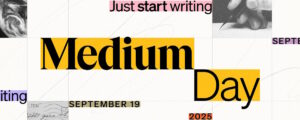I’ve been a judge for the Indie Author Project‘s Author of the Year Award since its inception in 2018, one of the “industry experts” who convene every year to select a winner based on an author’s “marketability, overall impact, personal brand, and potential for the author to break out.” The finalists are a shortlist of authors selected by regional committees of librarians based on the literary merit of their self-published books, but the Author of the Year award is a reflection of the author, their platform, and [some admittedly subjective] marketing dynamics.
It’s an unfortunate truth about books that it’s never simply been about being a good writer, but as literal thousands of new books are published every month, marketability is arguably more important — and harder to define — than it’s ever been. In the “good old days,” having the right connections in the right networks increased your potential to break out (or at least get a book deal), but nowadays even the most connected authors are competing with new and old books in new and old channels intermediated by new and old influencers, and most self-published authors bear additional responsibilities most traditionally published authors take for granted.
In its first couple of years, there was a noticeable gap amongst self-published authors’ online presences, ranging from amateurish webpages and Amazon links to professional-looking templated websites that differed mostly in the headshots and book covers populating them. Personal brands [barf emoji] were often limited to “self-published author” with little to no indication of the human being behind the curtain, while marketability and potential to break out varied even more wildly than it does in traditional publishing.
It’s been interesting to see how authors’ online presences have evolved since 2018, especially as the line between self- and traditionally published authors continues to blur. Author websites have mostly improved thanks to widespread use of book-specific templates, while opaque social metrics have become even less useful than ever. (“Amazon Best Seller” is my favorite!) [barf emoji]
The floor has been raised but the ceiling remains high, and a personal touch stands out more than ever — whether that’s a well-written About page, a consistently updated blog, or a compelling angle for a newsletter. Judging this year’s finalists, About pages and newsletters were major factors for me in separating who was sitting on the floor vs. having potential to break through the ceiling, and I was thrilled to see a consistently updated blog in the mix.
Author Platforms in 2024
One of the reasons I retreated from the poetry scene many, many years ago is I didn’t really have anything new to say, and no interest in continuing to perform my same old poems, or worse, slightly rewriting them and pretending they were new. [barf emoji] It’s also why I’ve run out of steam blogging several times over the years: I don’t like to repeat myself.
While a “good” blogger tweaks and republishes old posts with a fresh angle to chase new traffic, I’m just going to point you to what I wrote about author platforms back in 2018 because all of it still applies. The main tweak I’d make is to note that Substack normalizing newsletters makes capturing emails seem more basic than it really is, I’d still recommend simple email capture as a starting point because Substack also wants to be your website, and your social platform, and your revenue partner — and everyone should know by now that consolidating all of that anywhere but on your own website for which you own the domain and pay for its hosting yourself is a big no-no. When you’re ready to really jump into a newsletter, there are many options to explore, some of which will fit your online platform better than others.
Perhaps most interestingly, beyond the value of an email list, the pandemic reinforced the most undervalued aspect of what I outlined back then: GO ANALOG. Having an online presence is an absolute must these days, but authors with analog extensions are going to be more resilient and have way more potential to break out than someone who’s only comfortable operating behind a keyboard. Whether that’s a local reading series or book club, making friends with your local librarian or indie bookseller, or getting deeply engaged with a non-writing activity, it’s important to remember that an author’s platform isn’t primarily about scale; focus is way more valuable.
Do you like email?
Sign up here to get my bi-weekly "newsletter" and/or receive every new blog post delivered right to your inbox. (Burner emails are fine. I get it!)



YES.
Also, miss you.
Same! I suspect 2024 will find us in the same space at some point. Maybe ALA?
No ALA for me. We’ve got two going to PLA but I think I’m going to miss it.
Spot on. Two and half years after my book was published, I am even less clear on the best way to market/promote the book, especially with the usefulness of social media diminishing (in my opinion) daily. At this point, a refocus on my own platform feels like the best option. Thanks for this.
It’s rough, for sure, and authors have to shoulder even more of the responsibility, even if they have a big publisher. Staying visible in relevant and sustainable ways is important, so your newsletter is a good thing.